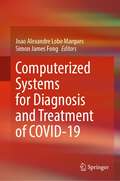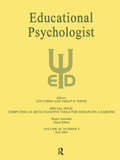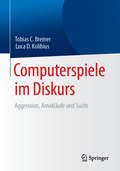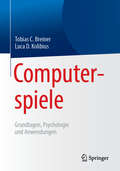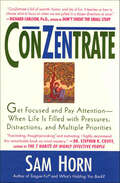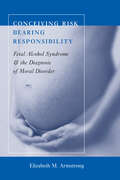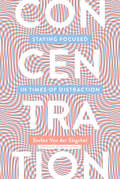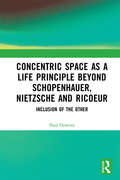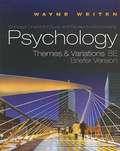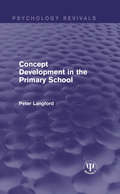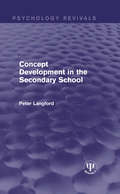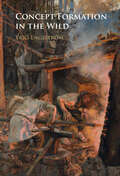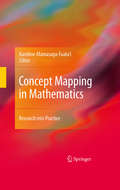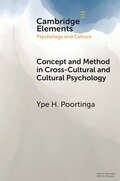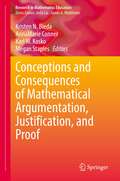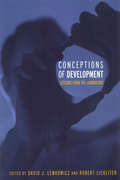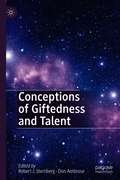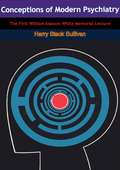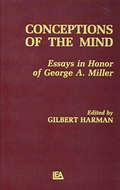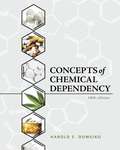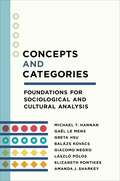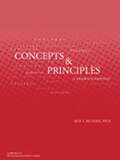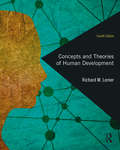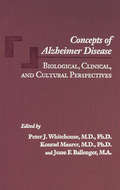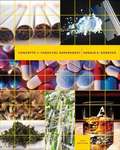- Table View
- List View
Computerized Systems for Diagnosis and Treatment of COVID-19
by Simon James Fong Joao Alexandre Lobo MarquesThis book describes the application of signal and image processing technologies, artificial intelligence, and machine learning techniques to support Covid-19 diagnosis and treatment. The book focuses on two main applications: critical diagnosis requiring high precision and speed, and treatment of symptoms, including those affecting the cardiovascular and neurological systems.The areas discussed in this book range from signal processing, time series analysis, and image segmentation to detection and classification. Technical approaches include deep learning, transfer learning, transformers, AutoML, and other machine learning techniques that can be considered not only for Covid-19 issues but also for different medical applications, with slight adjustments to the problem under study.The Covid-19 pandemic has impacted the entire world and changed how societies and individuals interact. Due to the high infection and mortality rates, and the multiple consequences of the virus infection in the human body, the challenges were vast and enormous. These necessitated the integration of different disciplines to address the problems. As a global response, researchers across academia and industry made several developments to provide computational solutions to support epidemiologic, managerial, and health/medical decisions. To that end, this book provides state-of-the-art information on the most advanced solutions.
Computers as Metacognitive Tools for Enhancing Learning: A Special Issue of Educational Psychologist
by Lyn Corno Philip H. WinneFirst published in 2005. Routledge is an imprint of Taylor & Francis, an informa company.
Computerspiele im Diskurs: Aggression, Amokläufe und Sucht
by Tobias C. Breiner Luca D. KolibiusDieses Fachbuch ist eine umfassende Abhandlung zur Debatte um die negativen Auswirkungen von Computerspielen: Aggressionen, Amokläufe und Sucht. Die kontroverse Debatte zur Beziehung zwischen Computerspielen und Aggression wird hier auf Grundlage neuster wissenschaftlicher Erkenntnisse aufgearbeitet. Darüber hinaus inspirierte die Aufnahme in die aktuellste Version des Klassifikationssystems DSM für Internet Gaming Disorder (Computerspielsucht) eine Vielzahl wissenschaftlicher Veröffentlichungen, welche hier übersichtlich zusammengetragen werden. In diesem Buch finden Sie die Antworten auf folgende Fragen: Welche Symptome machen eine Computerspielabhängigkeit aus und welche Therapiemöglichkeiten gibt es?Geht Computerspielsucht mit Veränderungen im Gehirn und der Persönlichkeit einher?Gibt es eine kausale Beziehung zwischen Computerspielen einerseits und Aggressivität und Amokläufen andererseits? Die Autoren kommen dabei nach Sichtung der Studienlage zu überraschenden Erkenntnissen. Dieses Buch unterstützt Psychologen, Psychotherapeuten, Psychiater, Pädagogen, Therapeuten, Lehrkräfte und Eltern die Welt der Computerspiele zu navigieren.
Computerspiele: Grundlagen, Psychologie und Anwendungen
by Tobias C. Breiner Luca D. KolibiusDieses Buch ist eine umfassende Abhandlung zur Debatte um die positiven Auswirkungen von Computerspielen. Es beantwortet folgende Fragen: - Warum spielen wir? - Hat Spielen einen evolutionären Sinn? - Welche Arten von Games existieren? - Welche Vor- und Nachteile haben Computerspiele gegenüber Spielen im echten Leben? - Was lässt sich mit Computerspielen heutzutage technisch realisieren und was nicht? - Wie lassen sich Computerspiele sinnvoll in Psychologie, Geriatrie und Medizin einsetzen? - Welches Potenzial haben sogenannte „Serious Games“ in Therapie und Bildung? Das Werk ist für jeden Pädagogen und Psychologen, der sich für digitale Interventionen interessiert sehr empfehlenswert. Da die Grundlagen von Games und der Spielepsychologie verständlich und umfassend dargestellt werden, ist kein spezielles Vorwissen nötig.
ConZentrate: Get Focused and Pay Attention—When Life Is Filled with Pressures, Distractions, and Multiple Priorities
by Sam Horn“Draws on the Zen concept of mindfulness as a means to calm the frenzied mindset that often accompanies contemporary life.” —Publishers WeeklyIf you ever feel cluttered, scattered, distracted, unfocused, disorganized, preoccupied, overwhelmed, out of control, out of your mind . . . you can change your life.ConZentrate shows you how to master the art of paying attention, in thirty-five clear, practical, simple ways. Whether it’s how to focus on a tedious task when the office is buzzing around you, or how to stop procrastinating, or how to keep your home from being a place of overwhelming clutter—or even how to tackle the challenges of A.D.D.—Sam Horn’s user-friendly book will inspire you to learn how to conzentrate, and discover the key to peak performance.“Fascinating, thought-provoking, and motivating. I highly recommend this remarkable book on mind mastery.” —Dr. Stephen R. Covey, author of The 7 Habits Of Highly Effective People
Conceiving Risk, Bearing Responsibility: Fetal Alcohol Syndrome and the Diagnosis of Moral Disorder
by Elizabeth M. ArmstrongIn American society, the consumption of alcohol during pregnancy is considered dangerous, irresponsible, and in some cases illegal. Pregnant women who have even a single drink routinely face openly voiced reproach. Yet fetal alcohol syndrome (FAS) in infants and children is notoriously difficult to diagnose, and the relationship between alcohol and adverse birth outcomes is riddled with puzzles and paradoxes. Sociologist Elizabeth M. Armstrong uses fetal alcohol syndrome and the problem of drinking during pregnancy to examine the assumed relationship between somatic and social disorder, the ways in which social problems are individualized, and the intertwining of health and morality that characterizes American society. She traces the evolution of medical knowledge about the effects of alcohol on fetal development, from nineteenth-century debates about drinking and heredity to the modern diagnosis of FAS and its kindred syndromes. She argues that issues of race, class, and gender have influenced medical findings about alcohol and reproduction and that these findings have always reflected broader social and moral preoccupations and, in particular, concerns about women's roles and place in society, as well as the fitness of future generations. Medical beliefs about drinking during pregnancy have often ignored the poverty, chaos, and insufficiency of some women's lives—factors that may be more responsible than alcohol for adverse outcomes in babies and children. Using primary sources and interviews to explore relationships between doctors and patients and women and their unborn children, Armstrong offers a provocative and detailed analysis of how drinking during pregnancy came to be considered a pervasive social problem, despite the uncertainties surrounding the epidemiology and etiology of fetal alcohol syndrome.
Concentration: Staying Focused in Times of Distraction
by Stefan Van Der StigchelHow to concentrate in a world of beeping smartphones, channel surfing, live-tweeting, pop-up ads, and other distractions.We are in the midst of an attention crisis—caused in large part by our smartphones. There's a constant stream of information that we are powerless to withstand because it shows up in our notifications. More and more of us are finding it harder and harder to concentrate. In this book, attention expert and cognitive psychologist Stefan Van der Stigchel explains how concentration works and offers advice on how to stay focused in a world of beeping smartphones, channel surfing, live-tweeting, pop-up ads, and other distractions.The good news, Van der Stigchel reports, is that we now know more about brain and behavior than ever before, and he draws on the latest scientific findings in his account of concentration. He explains, among other things, that the battle for our attention began long before the digital era; why our phones are so addictive; the importance of working memory (responsible for executing complicated tasks) and how to increase its capacity; and why multitasking is bad for our concentration, but attention rituals help it. He describes the 2017 Oscars debacle (when the Best Picture presenter was given the wrong card) as a failure of multitasking; argues that daydreaming can be good for our concentration; and shows that the presence of a passenger in a car reduces the risk of an accident. He explains the positive effects of taking “tech breaks” (particularly in natural surroundings), meditation, and even daydreaming. We can win the battle for our attention, Van der Stigchel argues, if we have the knowledge and the tools to do it.
Concentric Space as a Life Principle Beyond Schopenhauer, Nietzsche and Ricoeur: Inclusion of the Other
by Paul DownesConcentric Space as a Life Principle beyond Schopenhauer, Nietzsche and Ricoeur invites a fresh vision of human experience and search for life meanings in terms of potential openings through relational space. Offering a radical spatial rereading of foundational ideas of influential thinkers Schopenhauer, Nietzsche and Ricoeur, it argues that these ideas can be rethought for a more fundamental understanding of life, self and other. This book offers a radical reconceptualisation of space as an animating principle for life through common, although previously hidden, features across the thought of Schopenhauer, Nietzsche and Ricoeur. It offers a fresh spatial interpretation of key themes in these thinkers’ works, such as compassion, will to life, Dionysian rapture, will to power, selfovercoming, re-valuation of values, eternal recurrence, living metaphor and intersubjectivity. It proposes a spatial restructuring of experience from diametric spaces of exclusion towards concentric spaces of inclusion for an experiential restructuring towards unifying modes of experience. This spatial rereading of these major figures in philosophy directly challenges many previous understandings, to offer a distinctive spatial-phenomenological framework for examining a life principle. This book will appeal to academics, researchers and postgraduates engaged in the study of philosophy, wellbeing, education and human development. The book’s interdisciplinary scope ensures that it is also of interest for those in the fields of psychology, anthropology, psychoanalysis and culture studies.
Concept Charts for Study and Review to Accompany Psychology: Themes and Variations, Briefer Edition (8th Edition)
by Wayne WeitenThis effective and popular resource, written by textbook author Wayne Weiten to help students prepare for lectures, organize class notes, and review content for exams, is bundled at no additional cost with every new student copy of the text. Each chapter's Concept Chart offers a full-color overview--a detailed visual map of key ideas found in the chapter. These color-coded, hierarchically-organized charts create snapshots of the chapters that should allow your students to quickly see the relationships among ideas and sections.
Concept Development in the Primary School (Psychology Revivals)
by Peter LangfordOriginally published in 1987, this book introduces work on the intellectual development of children in the primary school. It contains chapters on the teaching of reading, writing, art, science and mathematics. While critical of many of the once popular ideas of Jean Piaget, the author also emphasises the continuing validity of some aspects of Piaget’s thinking.
Concept Development in the Secondary School (Psychology Revivals)
by Peter LangfordOriginally published in 1987, this book introduces the reader to work on the intellectual development of adolescents relevant to the secondary school teacher. It covers the teaching of English, history, geography, economics, politics, legal studies, physics, chemistry, biology and mathematics. Although it emphasises the continuing importance of Piaget’s thought, the book aims to introduce readers to the non-Piagetian research that had taken place in recent years.
Concept Formation in the Wild
by Yrjö EngeströmConcept formation is predominantly analyzed in classrooms and laboratory experiments, meaning the collective formation of culturally novel concepts in practical activities 'in the wild' has largely been neglected. However, understanding and influencing the complexity and contradictions of the present world demands powerful concepts that can make a difference in practice. Going beyond the understanding of concepts as individually acquired static labels, this book develops a dialectical theory of collective formation of novel concepts in the wild, in everyday activities. Drawing on cultural-historical activity theory (CHAT), concepts are seen as contested and future-oriented means for guiding activities and their transformations. Detailed real-life examples of germ-cell concepts show how they can radically influence the course of development in different activities. Helping to identify and foster the formation of potentially powerful concepts in fields of practice, it is essential reading for researchers, advanced students and practitioners across human and social sciences.
Concept Mapping in Mathematics: Research into Practice
by Karoline Afamasaga-Fuata'IConcept Mapping in Mathematics: Research into Practice is the first comprehensive book on concept mapping in mathematics. It provides the reader with an understanding of how the meta-cognitive tool, namely, hierarchical concept maps, and the process of concept mapping can be used innovatively and strategically to improve planning, teaching, learning, and assessment at different educational levels. This collection of research articles examines the usefulness of concept maps in the educational setting, with applications and examples ranging from primary grade classrooms through secondary mathematics to pre-service teacher education, undergraduate mathematics and post-graduate mathematics education. A second meta-cognitive tool, called vee diagrams, is also critically examined by two authors, particularly its value in improving mathematical problem solving. Thematically, the book flows from a historical development overview of concept mapping in the sciences to applications of concept mapping in mathematics by teachers and pre-service teachers as a means of analyzing mathematics topics, planning for instruction and designing assessment tasks including applications by school and university students as learning and review tools. This book provides case studies and resources that have been field tested with school and university students alike. The findings presented have implications for enriching mathematics learning and making problem solving more accessible and meaningful for students. The theoretical underpinnings of concept mapping and of the studies in the book include Ausubel's cognitive theory of meaningful learning, constructivist and Vygotskian psychology to name a few. There is evidence particularly from international studies such as PISA and TIMSS and mathematics education research, which suggest that students' mathematical literacy and problem solving skills can be enhanced through students collaborating and interacting as they work, discuss and communicate mathematically. This book proposes the meta-cognitive strategy of concept mapping as one viable means of promoting, communicating and explicating students' mathematical thinking and reasoning publicly in a social setting (e.g., mathematics classrooms) as they engage in mathematical dialogues and discussions. Concept Mapping in Mathematics: Research into Practice is of interest to researchers, graduate students, teacher educators and professionals in mathematics education.
Concept and Method in Cross-Cultural and Cultural Psychology (Elements in Psychology and Culture)
by Ype H. PoortingaAn overview is given of cross-cultural psychology and cultural psychology, focusing on theory and methodology. In Section 1 historical developments in research are traced; it is found that initially extensive psychological differences tend to shrink when more carefully designed studies are conducted. Section 2 addresses the conceptualization of “culture” and of “a culture”. For psychological research the notion “culture” is considered too vague; more focal explanatory concepts are required. Section 3 describes methodological issues, taking the notion of the empirical cycle as a lead for both qualitative and quantitative research. Pitfalls in research design and data analysis of behavior-comparative studies, and the need for replication are discussed. Section 4 suggests to move beyond research on causal relationships and to incorporate additional questions, addressing the function and the development of behavior patterns in ontogenetic, phylogenetic and historical time. Section 5 emphasizes the need for applied research serving the global village.
Conceptions and Consequences of Mathematical Argumentation, Justification, and Proof (Research in Mathematics Education)
by Kristen N. Bieda AnnaMarie Conner Karl W. Kosko Megan StaplesThis book aims to advance ongoing debates in the field of mathematics and mathematics education regarding conceptions of argumentation, justification, and proof and the consequences for research and practice when applying particular conceptions of each construct. Through analyses of classroom practice across grade levels using different lenses - particular conceptions of argumentation, justification, and proof - researchers consider the implications of how each conception shapes empirical outcomes. In each section, organized by grade band, authors adopt particular conceptions of argumentation, justification, and proof, and they analyse one data set from each perspective. In addition, each section includes a synthesis chapter from an expert in the field to bring to the fore potential implications, as well as new questions, raised by the analyses. Finally, a culminating section considers the use of each conception across grade bands and data sets.
Conceptions of Development: Lessons from the Laboratory
by David J. Lewkowicz Robert LickliterFirst published in 2002. Routledge is an imprint of Taylor & Francis, an informa company.
Conceptions of Giftedness and Talent
by Robert J. Sternberg Don AmbroseThis book brings together eminent and emerging scholars to present cutting-edge research on diverse conceptions of giftedness and talent from a range of international perspectives. It covers classical views, emphasizing IQ, but also seeks to move the academic debate on from the common exclusive emphasis on IQ-based skills. In each chapter the contributors address both theoretical advances and practical applications for administrators, teachers, and parents. The editors conclude by integrating the different points of view and showing ways in which major ideas, even when given different names, can be integrated to provide a holistic and integral viewpoint on giftedness and talent. This book will appeal to students and scholars of creativity, giftedness and gifted education; as well as to practitioners, teachers and education policymakers.
Conceptions of Modern Psychiatry: The First William Alanson White Memorial Lecture
by Harry Stack SullivanThe central ideas making up Harry Stack Sullivan’s theory of personality find their first expression in this book. Here he set forth his view of psychiatry as the study of interpersonal relations. “Psychiatry,” he wrote, “is the study of processes that involve or go on between people. The field of psychiatry is the field of interpersonal relations under any and all circumstances in which these relations exist. A personality can never be isolated from the complex of interpersonal relations in which the person lives and has his being.”Through his development of the theory of interpersonal relations, Harry Stack Sullivan not only made a vital contribution on the treatment of mental disorder—in particular, schizophrenia—but he opened an entirely new approach to the study of human personality. “The core of Sullivan’s theory,” says Lloyd Frankenberg in the New York Times, “is that people, interacting, shape people….He has evolved an analytic method, for all its subtlety and elaboration, wonderfully coherent, organic and usable.”The influence of Harry Stack Sullivan has had a powerful impact. He has been called one of the half dozen truly great figures in American social psychology, one who has opened new horizons of research and, in the view of many analysist, made the most original contribution to psychiatry since Freud.
Conceptions of the Human Mind: Essays in Honor of George A. Miller
by Gilbert HarmanThis volume is a direct result of a conference held at Princeton University to honor George A. Miller, an extraordinary psychologist. A distinguished panel of speakers from various disciplines -- psychology, philosophy, neuroscience and artificial intelligence -- were challenged to respond to Dr. Miller's query: "What has happened to cognition? In other words, what has the past 30 years contributed to our understanding of the mind? Do we really know anything that wasn't already clear to William James?" Each participant tried to stand back a little from his or her most recent work, but to address the general question from his or her particular standpoint. The chapters in the present volume derive from that occasion.
Concepts Of Chemical Dependency
by Harold DoweikoCONCEPTS OF CHEMICAL DEPENDENCY, 10th Edition, provides comprehensive coverage and the latest information on a spectrum of substance use disorders and the compounds commonly misused. Author Harold Doweiko also covers topics not usually discussed in other substance abuse texts, including anabolic steroids, inhalants, infectious diseases associated with substance misuse, the medical marijuana debate and how the war on drugs has contributed to the problem of substance use disorders. Students report that they appreciate the balanced approach, which allows them to form their own opinions and doesn't preach that drugs are bad for you. This edition includes new information on synthetic drugs, updates reflecting new preferred language in referring to those who struggle with substance use disorders and a new chapter on substance use and misuse in older adults. <P><P><i>Advisory: Bookshare has learned that this book offers only partial accessibility. We have kept it in the collection because it is useful for some of our members. Benetech is actively working on projects to improve accessibility issues such as these.</i>
Concepts and Categories: Foundations for Sociological and Cultural Analysis (The Middle Range Series)
by Michael T. Hannan László Pólos Greta Hsu Giacomo Negro Gaël Le Mens Balázs Kovács Elizabeth Pontikes Amanda J. SharkeyWhy do people like books, music, or movies that adhere consistently to genre conventions? Why is it hard for politicians to take positions that cross ideological boundaries? Why do we have dramatically different expectations of companies that are categorized as social media platforms as opposed to news media sites? The answers to these questions require an understanding of how people use basic concepts in their everyday lives to give meaning to objects, other people, and social situations and actions.In this book, a team of sociologists presents a groundbreaking model of concepts and categorization that can guide sociological and cultural analysis of a wide variety of social situations. Drawing on research in various fields, including cognitive science, computational linguistics, and psychology, the book develops an innovative view of concepts. It argues that concepts have meanings that are probabilistic rather than sharp, occupying fuzzy, overlapping positions in a “conceptual space.” Measurements of distances in this space reveal our mental representations of categories. Using this model, important yet commonplace phenomena such as our routine buying decisions can be quantified in terms of the cognitive distance between concepts. Concepts and Categories provides an essential set of formal theoretical tools and illustrates their application using an eclectic set of methodologies, from micro-level controlled experiments to macro-level language processing. It illuminates how explicit attention to concepts and categories can give us a new understanding of everyday situations and interactions.
Concepts and Principles of Behavior Analysis
by Jack L. MichaelConcepts and Principles of Behavior Analysis
Concepts and Theories of Human Development
by Richard M. LernerConcepts and Theories of Human Development is the most comprehensive and in-depth overview of the foundational theoretical contributions to understanding human development and the influence of these contributions for contemporary research and application in developmental science. Since its initial publication in 1976, it has been an essential resource for students and professionals alike, and has become the go-to book for graduate students studying for their comprehensive exam on human development. In this new Fourth Edition, Richard M. Lerner concentrates his focus on advanced students and scholars already familiar with the basic elements of major psychological theories. The book discusses the assumptions involved in such topics as stage theories, the nature-nurture issue, the issue of continuity-discontinuity, and the important role of philosophical ideas about theories – in particular, metatheories – in understanding the links between theory and research. It particularly focuses on relational developmental systems (RDS) metatheory, exploring its roots in the 1930s, following its development into the present day, and contrasting it with the fundamentally flawed genetic reductionist models that continue to be circulated by scientists, the media, and the general public. It discusses implications of theory for research methods and for applications aimed at the promotion of health, positive development, and social justice among diverse people across the life span.
Concepts of Alzheimer Disease: Biological, Clinical, and Cultural Perspectives (Gerontology)
by Peter J. Whitehouse Konrad Maurer Jesse F. BallengerAs the essays in this volume show, conceptualizing dementia has always been a complex process. With contributions from noted professionals in psychiatry, neurology, molecular biology, sociology, history, ethics, and health policy, Concepts of Alzheimer Disease looks at the ways in which Alzheimer disease has been defined in various historical and cultural contexts.The book covers every major development in the field, from the first case described by Alois Alzheimer in 1907 through groundbreaking work on the genetics of the disease. Essays examine not only the prominent role that biomedical and clinical researchers have played in defining Alzheimer disease, but also the ways in which the perspectives of patients, their caregivers, and the broader public have shaped concepts.
Concepts of Chemical Dependency (7th edition)
by Harold E. DoweikoIncorporating the science, sociology, and criminology behind addiction and its treatment, this textbook introduces basic facts about substance abuse and addiction in the US, describes the physical and social effects of particular drugs, and presents strategies for evaluation, intervention, and recovery. The sixth edition adds two closing chapters on legalization and criminal behavior.
